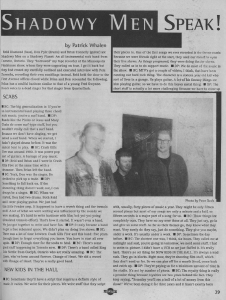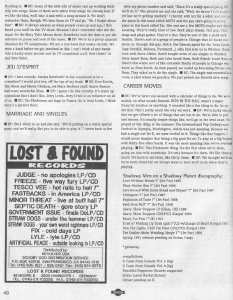Shadowy Men Speak!
by Patrick Whalen
Reid Diamond (bass), Don Pyle (drums) and Brian Connelly (guitar) are Shadowy Men On A Shadowy Planet: An all instrumental rock band from Toronto, Ontario. They "borrowed" my tape recorder at the Minneapolis Fleshtones show, whom they were supporting on tour. I got it back but they had erased my carefully outlined and executed interview with Pete Zaremba, recording their own ramblings instead. Reid held the door to the First Avenue offices closed while Brian and Don recounted the following. Brian has a soulful baritone similar to that of a young Fred Gwynne. Don's voice is a dead ringer for that singer from Quarterflash.
SCABS
BC: The big generalization is: If you're an instrumental band playing three chord rock music, you're a surf band.
DP: Bands like the Pixies or Jesus And Mary Chain do some surf-type stuff, but you really wouldn't call that a surf band. Because we don't have singing, we get called a surf band. When we started, I hadn't played the drums before. It was the easiest beat to play.
BC: Crash Kills Five was around 1980. It was power pop sort of guitars. A barrage of pop music.
DP: Reid and Brian and I were in Crash Kills Five at the same time with a drummer. Then Brian left the band.
BC: Yeah, Don was the singer. He decided to pick up a trade.
DP: Something to fall back on. If the drumming thing doesn't work out, I can always be a singer.
BC: When we started, Don had two drums. Both Reid and I were playing guitar. We just had this little Fender amp. It happened to have a reverb thing and the tremolo stuff. A lot of what we were writing was influenced by the sounds we were making. It's hard to write hardcore with like, boi-yoi-yoi-yoing (similuated tremolo effect). That's how it started. It wasn't even a band. We just got together to write and have fun.
DP: It only became a band to get a free rehearsal space. We didn't plan on doing live shows.
BC: There was a lot of time between Crash Kills Five and this band: five years. Enough time to forget all you know. You have to start all over again.
DP: Enough time for the scabs to heal.
BC: There's some good stuff happening in Toronto now.
DP: There's a band called King Cobb Steelie from Guelph, Ontario who are really amazing.
BC: The Lawn, who've been around forever. Change Of Heart. We did a record with Change Of Heart. They're a really good band.
NEW KIDS IN THE HALL
BC: Sometimes they'll have a script that requires a definite style of music. It varies. We write for their pieces. We write stuff that they script their pieces to. One of the first songs we ever recorded was the theme music. Because we were friends right at the start, they used our record to open their live shows. As things progressed, they were doing theater shows. They called us in to do support music.
DP: We do most of the music in the show.
BC: MTV's got a couple of videos, I think, that have been running our hard rock thing. The character is a sixteen year old kid who sort of lives in a garage. He plays guitar. A lot of his fantasy things are him playing guitar, so we have to do this heavy metal thing.
DP: The short stuff is actually a lot more challenging because we have to come up with, usually, forty pieces of music a year. They might be only fifteen second pieces but most of our songs are only a minute and a half, so fifteen seconds is a major part of a song for us.
BC: Those things are completely ours. They have no say over those at all. They just say, go in and give us some stuff. As far as their themes go, they know what they want. Very rarely do they say, just do something. They give you, maybe, under a week. It's usually under a week.
DP: Sometimes the day before.
BC: The shortest one was, I think, six hours. They called me at midnight and said, you're going in tomorrow, we need some stuff. I had to write-to-picture. I didn't have a VCR so we just fluffed it. It's really hard. There's no set thing for NEW KIDS IN THE HALL. It's always a mad rush. They go in blocks. Right now, they're shooting film stuff, which they don't need us for. So we can piss off for a month, tour, come back and catch up.
DP: They're paying us for a minimum amount of time in the studio. It's not by number of pieces.
BC: They royalty thing is really a promise thing because royalties are two years behind the fact. They keep saying, "Someday you'll see a hell of a lot of money from this show!" We've been doing it for three years and it hasn't exactly been flooding in.
DP: Some of the little bits of music end up working their way into songs. Some of them were taken from songs we already had. If we like the idea, we'll take it and write a song around it. We don't remember them, though. We hear them on TV and go, "Oh. I forgot about that."
BC: It always amazes me when people come up and say, I first heard your stuff on this TV show. Because I don't remember who did the music for the Mary Tyler Moore show. Somebody took the time to put the machine on pause and look at the name.
DP: We're in a pretty unusual situation for TV soundtracks. We are a real band that makes records. We were a band before we got involved with this. I can't think of any other bands that actually make records and do TV soundtrack stuff. New Order? Us and New Order.
JEU D'ESPRIT
DP: I hate comedy. Sandra Bernhard? Is she considered to be a comedian? I would pick her, off the top of my head.
BC: Don Knotts, The Ghost and Mister Chicken, old Marx Brothers stuff. Buster Keaton had some wonderful films.
DP: I guess I do like comedy. It's stand up comedians that I don't like. Jerry Lewis. Jerry Lewis is an influence on all of us.
BC: The Fleshtones are huge in France. So is Jerry Lewis. I think there's a parallel there.
MARRIAGE AND SINGLES
DP: Beck wrote to us and she said, "We're putting on a really special party and we'd really like you to be able to play it." I wrote back to her with my phone number and said, "Since it's a really special party, OK, we'll do it." She phoned me and she said, "Well, we haven't told anybody yet but we're getting married." I chatted with her for a while and she said she plays in this band called MOTO and the guy she's going to marry plays in this band called Tar. She sent me a few MOTO singles and they're amazing. They're really kind of raw. Beck plays drums. This guy, Paul, sings and plays guitar. They're a duo. They're sort of like a punk rock Beatles. There's sort of a group of people in Chicago who all found out about us through this guy, Botch (the famous agent for the Jesus Lizard, Urge Overkill, Mekons, Pavement …), who had seen us in Windsor. Botch lives with Steve Albini. Botch bought some of our singles in Windsor. Steve heard them. Beck and John heard them, their friends heard them, so there's this whole sort of like extended family of people in Chicago who know us from Botch. As time passed, we ended up becoming friends with them. They asked us to do the single.
BC: The single was recorded in a room, a shed where we practice. We just picked our favorite love songs.
CAREER MOVES
BC: We've never run around with a calendar of things to do. We work mainly on what sounds funnest. KIDS IN THE HALL wasn't a major financial decision or anything. It sounded like a fun thing to do. So we did that. That's pretty much the way we work.
DP: We're lucky enough that we get offered a lot of things that are fun to do. We're able to pick and choose. It's usually simple things like, we'll go to the west coast. We played at this thing in the summer: The International Pop Underground Festival in Olympia, Washington, which was just amazing. Because we had a single out for K, we were invited to it. Things like that happen. I would never imagine that being a big goal for us: To play at a big festival with thirty-five other bands. It was the most amazing time we've ever had playing.
BC: This Fleshtones thing. It's the first show we've done, going on tour with somebody. It's only because it's them. We like them so much. We have to see them, like thirty times.
DP: We thought we'd see them thirty times but we always seem to have stuff to do when they're playing.


